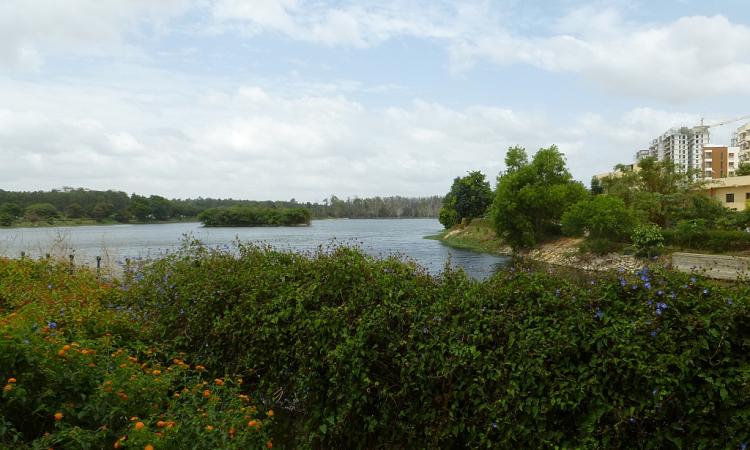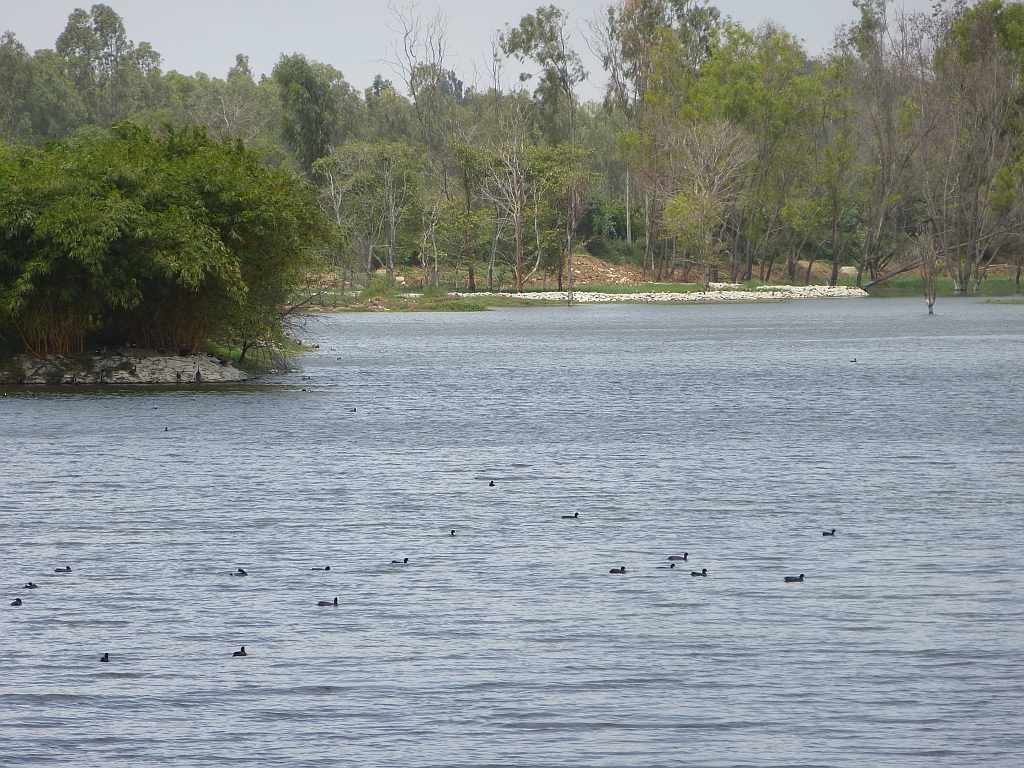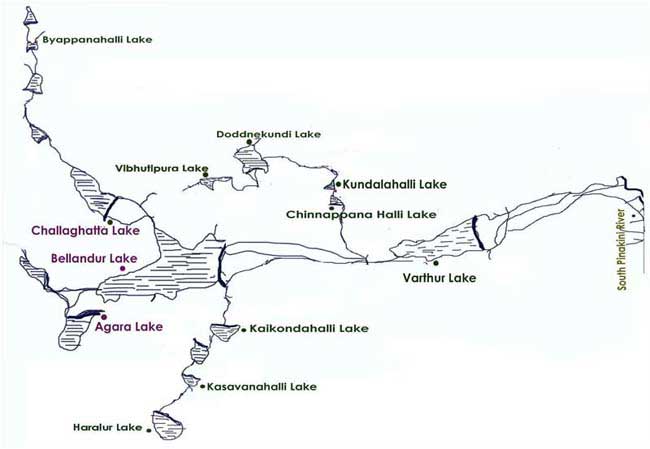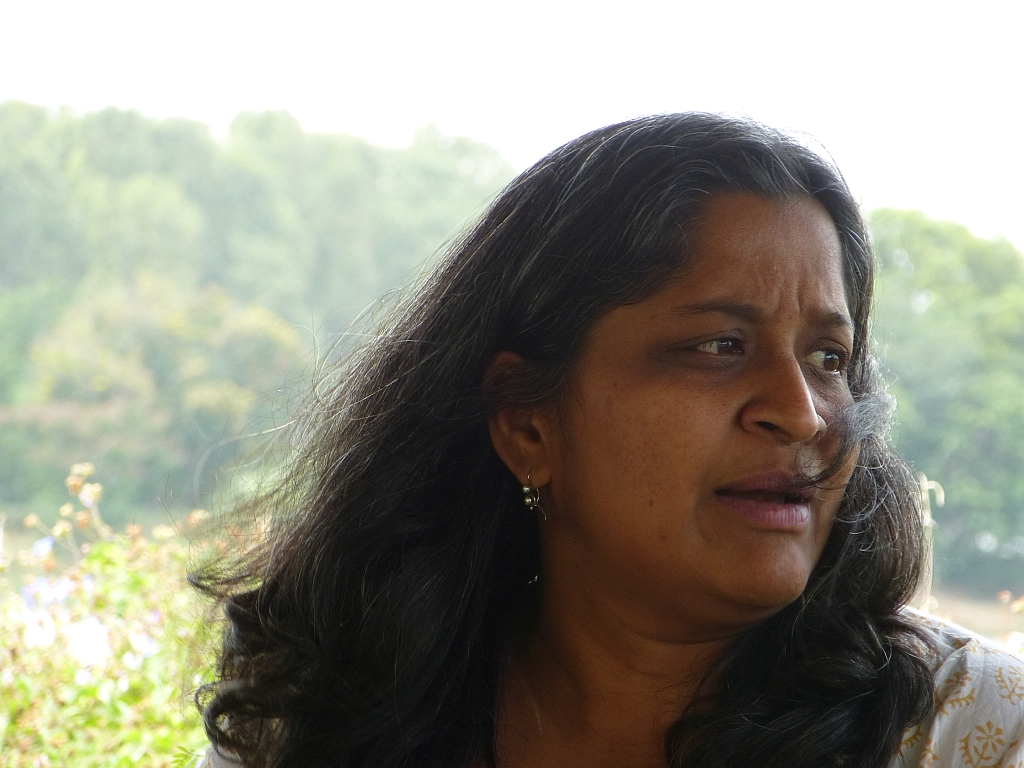
Priya Ramasubban personifies the words ‘good things come in small packages’. This sprightly, self motivated enthusiast, saw a marshy, polluted cess pool, hemmed in by an open tract of land, where labourers and migrants daily dipped in for their morning ablutions. Talking to people around, she realised that this soggy piece of wetland was once a lake. Kaikondarahalli Lake was part of a manmade chain of lake systems, built hundreds of years ago.
What better way to see how to resolve this stinky situation than to put her foot right into this foul water!
Who 'owns' the lake?
Another fellow lake enthusiast, Ramesh, heard of this lady who was hell bent on doing ‘something’ for the lake, and joined forces with her. Professionals chipped in with their expertise and the team slowly grew a little stronger every day. An initial enquiry showed that the land ownership lay with the Municipal Corporation, and a march into the BBMP office revealed that a budget had been sanctioned for the lake's redevelopment!
Serendipity? Maybe, but the team treated it more as a fortunate coincidence that would help the lake recovery work to begin sooner than later. However, a quick look at the proposed redevelopment plan was enough to dampen their spirits. Boating jetties, gazebos and exotic gladioli gardens, something that none of them had pictured for their lake, was what was proposed. Realising that the plan seemed exclusive to a few, the team decided to propose plans of their own.
How should the rejuvenated lake look?
Armed with their own simple ideas and a few half-baked measures on what could be done for the lake rejuvenation, they began their journey. Who was in charge of the lake? Why was sewage being dumped into it? Was that even legal?
There were many questions but not nearly enough answers. So the growing handful of volunteers contacted pollution control officials, environmentalists, local panchayats, bureaucrats and many others. They desperately needed to gather more tangible information on the lake and also inputs from experts on how to put together an effective plan for the dying lake.
Their ideas were clear. They wanted the lake to remain in as much a natural state as  possible, store water, encourage the revival of original flora and fauna species and keep it accessible to the public at large. For them, ecology was more important than aesthetics from a touristic perspective. They knew that the only way the lake would return to its original state was if the community was involved and felt that they belonged.
possible, store water, encourage the revival of original flora and fauna species and keep it accessible to the public at large. For them, ecology was more important than aesthetics from a touristic perspective. They knew that the only way the lake would return to its original state was if the community was involved and felt that they belonged.
So the lake team came up with a counter plan to the BBMP's. They shot down the idea of jetty rides, ensured that the planned walk lane that chomped its way through the huge acacia trees would skirt around them instead, shared a list of indigenous trees that could be planted and also raised Rs 70,000 to take on the responsibility of initiating the tree planting.
Drawings on paper come to life...slowly!
From the drawing board to the actual implementation was a continuous struggle. Priya says, "We stood along with the people from the Horticulture Department to ensure that each sapling planted was indigenous to this region". The bund around the lake had been reshaped into a road over the last hundred years. Christened Sarjapur Road, it today faces maddening traffic snarls thanks to the many apartment complexes and office spaces present. Although the BBMP had fenced off parts of the lake, its road widening agenda made further fencing along the roadside a problem. Priya recollects, "The para military force was called in, and we had to ensure that no one uprooted or pushed our fence, till the cement set in".
 Old maps also showed that this lake was a part of a seven chain lake system, and was sixth along the line. Therefore, for the longer term sustainability, the other six would also have to be rejuvenated in the near future.
Old maps also showed that this lake was a part of a seven chain lake system, and was sixth along the line. Therefore, for the longer term sustainability, the other six would also have to be rejuvenated in the near future.
A lake once again
As the struggle intensified, more and more people pitched in. The community began to take pride in how a few citizens had transformed a dumping zone into a thriving habitat, through sheer grit and will. Today this wide, serene expanse of water is home to white cheeked barbets, herons, swamp hens, egrets, cicadia, and at least 40 other bird species. Pelicans came in last year and the hope is that they will roost soon too. Cobra and Russell's vipers slither in the grass, there is fish in the waters and tree frogs spawn in the lakes truly making it a home and sanctuary for many creatures.
An amphitheatre has been built for events, but no lights and mikes are allowed so as to not disturb the birds. A small  ‘kalyani’ has been built to facilitate religious ceremonies. This is especially useful during festivals when deities are immersed in the water as this ensures that the lake remains unpolluted. Traditional use of the lake is encouraged; people who have cows are allowed to cut fodder for free.
‘kalyani’ has been built to facilitate religious ceremonies. This is especially useful during festivals when deities are immersed in the water as this ensures that the lake remains unpolluted. Traditional use of the lake is encouraged; people who have cows are allowed to cut fodder for free.
The community and the lake are still finding their balance and what it takes to keep a lake such as this alive and well in today's changed circumstances. The effort, initiated by a group of motivated and dedicated individuals, has worked because there has been cooperation between the people and the BBMP. 'The' water body is now 'their' water body. It is a community asset that is both ecologically sustainable and socially acceptable.
And all it took was 1 persistent person to put their foot in and make the first splash!
A look at the latest ongoing activities in and around Kaikondrahalli Lake .